Podcast
Questions and Answers
¿Quién es comúnmente conocido como AMLO y ganó la presidencia de México en 2018?
¿Quién es comúnmente conocido como AMLO y ganó la presidencia de México en 2018?
- PRI
- MORENA
- AMLO (correct)
- PAN
¿Cuál partido político dominó la política nacional mexicana hasta el año 2000?
¿Cuál partido político dominó la política nacional mexicana hasta el año 2000?
- PRD
- PAN
- PRI (correct)
- MORENA
¿Qué partido político fue formado por miembros de la oposición al PRI y ganó prominencia en gobiernos estatales antes de ganar las elecciones federales en el año 2000?
¿Qué partido político fue formado por miembros de la oposición al PRI y ganó prominencia en gobiernos estatales antes de ganar las elecciones federales en el año 2000?
- PT
- PAN (correct)
- PRD
- MORENA
¿Qué partido político se convirtió en dominante bajo el liderazgo de AMLO?
¿Qué partido político se convirtió en dominante bajo el liderazgo de AMLO?
¿En qué año se fundó el PRI y cuál fue su principal problema en las décadas previas al año 2000?
¿En qué año se fundó el PRI y cuál fue su principal problema en las décadas previas al año 2000?
¿Qué desafío persiste en México a pesar de ciertos avances en décadas recientes?
¿Qué desafío persiste en México a pesar de ciertos avances en décadas recientes?
¿Quién fue apodado 'El Presidente Vida' por sus tres mandatos no consecutivos entre 1876 y 1911?
¿Quién fue apodado 'El Presidente Vida' por sus tres mandatos no consecutivos entre 1876 y 1911?
¿Quién implementó reformas sociales significativas como la redistribución de tierras de grandes haciendas a campesinos durante su presidencia de 1934 a 1940?
¿Quién implementó reformas sociales significativas como la redistribución de tierras de grandes haciendas a campesinos durante su presidencia de 1934 a 1940?
¿Cuál presidente mexicano lideró el país desde 1982 hasta 1988 e implementó medidas de liberalización económica llamadas el 'Nuevo Modelo Económico Mexicano'?
¿Cuál presidente mexicano lideró el país desde 1982 hasta 1988 e implementó medidas de liberalización económica llamadas el 'Nuevo Modelo Económico Mexicano'?
¿Qué presidente jugó un papel clave en la implementación del Tratado de Libre Comercio de América del Norte (TLCAN) durante su mandato de 1988 a 1994?
¿Qué presidente jugó un papel clave en la implementación del Tratado de Libre Comercio de América del Norte (TLCAN) durante su mandato de 1988 a 1994?
¿Cuál presidente mexicano fue elegido en 1911 y posteriormente asesinado tras un golpe de estado liderado por Victoriano Huerta?
¿Cuál presidente mexicano fue elegido en 1911 y posteriormente asesinado tras un golpe de estado liderado por Victoriano Huerta?
'El Presidente Vida' ocupó el cargo presidencial durante tres mandatos no consecutivos entre 1876 y 1911. ¿Quién fue este presidente mexicano?
'El Presidente Vida' ocupó el cargo presidencial durante tres mandatos no consecutivos entre 1876 y 1911. ¿Quién fue este presidente mexicano?
Flashcards are hidden until you start studying
Study Notes
Politics and Politicians in Mexico
Mexican politics is characterized by its dynamic nature, with frequent changes in administrations and policies. This section will delve into the main subtopics related to politics in Mexico, including the presidential lineage, major political parties, electoral processes, and the issue of governmental corruption.
Presidents of Mexico
The modern history of Mexican presidents can be traced back to Benito Juárez, who first held office from 1858 to 1872 during the Reforma period. Since then, Mexico has had several notable presidents:
- Porfirio Díaz served three nonconsecutive terms between 1876 and 1911, earning him the nickname El Presidente Vida ("the eternal president").
- Francisco Madero, known for his anti-reelection efforts, was elected president in 1911, only to be assassinated following a coup d'état led by Victoriano Huerta.
- Lázaro Cárdenas, who led the country from 1934 to 1940, implemented significant social reforms such as redistributing land from large estates to peasants.
- Miguel de la Madrid, serving from 1982 to 1988, oversaw economic liberalization measures called the New Mexican Economic Model, which aimed to stabilize inflation and attract foreign investment.
- Carlos Salinas de Gortari, in power from 1988 to 1994, played a key role in implementing NAFTA, the North American Free Trade Agreement, which integrated Mexico's economy more closely with those of Canada and the United States.
- Andrés Manuel López Obrador, commonly known as AMLO, won the presidency of Mexico in 2018 after losing two previous bids and has been credited with increasing public employment, reducing unemployment, and decreasing poverty rates in Mexico.
These figures have shaped Mexican politics through their tenures, which often coincide with periods of significant change within the country.
Political Parties in Mexico
Political party systems in Mexico have evolved over time, with some lasting longer than others. Key players in contemporary Mexican politics include:
- Institutional Revolutionary Party (PRI): Founded in 1929 and dominated national politics until 2000, amid widespread accusations of corruption and fraud.
- National Action Party (PAN): Formed by members of the opposition to the PRI, it gained prominence in state governments before winning the federal election in 2000.
- Democratic Revolution Party (PRD) : A leftist populist party formed by a group of PRI defectors, later alienated many former supporters due to internal conflicts and scandals.
- Movement for National Regeneration (MORENA) : Created in 2014, this party became dominant under AMLO's leadership and has since retained considerable influence.
Additionally, there are smaller parties like the Green Ecologist Party of Mexico (PVEM), the Labor Party (PT), and the Worker's Party (TT). Elections frequently result in coalition governments rather than single-party majority rule.
Elections in Mexico
Electoral processes in Mexico involve multiple levels and types of elections:
- Federal level: These cover the offices of president, senators, and deputies in the federal congress.
- State level: Governorships, mayors, city councils, and local representatives are all part of these elections.
- Local level: Here, municipal mayors and councilmembers are chosen in each municipality throughout Mexico.
Voting age in Mexico is set at 18 years old, although citizens over 16 but younger than 18 can vote if they meet certain requirements regarding their education.
Government Corruption in Mexico
Corruption remains an ongoing challenge for Mexico despite some progress in recent decades. Some examples of high-profile cases involving institutional misconduct include:
- In 2009, José Luis Santiago Vasconcelos, head of PEMEX, the state oil company, resigned due to allegations of corruption involving his family members.
- In August 2016, 37 people were arrested across nine states on charges ranging from bribery to money laundering under Operation Carwash, stemming from a massive investigation launched in Brazil.
- Former governor of Veracruz Javier Duarte fled Mexico in early 2017 facing 92 criminal charges, including embezzlement and organized crime ties.
However, Mexico also showcases successes against corruption. For instance, the Attorney General's Office successfully prosecuted Joaquín Guzmán Loera, alias 'El Chapo,' in October 2019, resulting in a life sentence without parole. Additionally, the Lopez Obrador administration has made efforts to fight corruption publicly, leading to convictions against some prominent officials. Despite these steps forward, there continues to be concern about deep-rooted systemic problems within Mexican society.
Studying That Suits You
Use AI to generate personalized quizzes and flashcards to suit your learning preferences.





